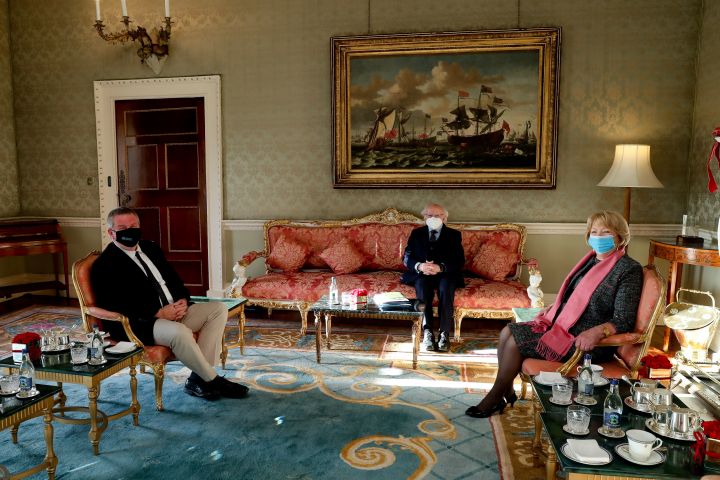
President Michael D. Higgins today received Dr Michael Ryan, Executive Director of the World Health Organisation (WHO) Health Emergencies Programme, at a courtesy call in Áras an Uachtaráin.
President Higgins presented Dr Ryan with a Presidential Distinguished Service Award, in recognition of his enormous service to global public health over the course of a number of decades. Dr Ryan had been due to receive the award, which recognises the contribution of members of the Irish diaspora, at a ceremony in the Áras on 2 December 2021, where the 2020 and 2021 recipients received their awards, however he was not able to attend on that occasion due to his ongoing work with the WHO.
At their meeting, Dr Ryan briefed President Higgins on the WHO’s work to date to combat the COVID-19 pandemic, including the challenges posed by the Omicron outbreak, and also discussed the importance of equitable vaccine access with the President. He thanked the President for offering his support towards achieving the important principle of universal access to COVID-19 vaccines.
The President and Dr Ryan discussed the facts presented at the press briefing of 29th December by WHO Director Dr Tedros Adhanom Ghebreyesus and leading members of his team, including Dr Ryan. Recent figures are showing extremely low vaccination rates in the global south, and in Africa in particular, with only 6% of people living in Africa fully vaccinated and 27% of healthcare workers across Africa fully vaccinated.
Among the very practical examples that Dr Ryan suggested where Ireland could make an immediate contribution would be perhaps in supporting the Technology Transfer Hub in South Africa through accelerating training and biomanufacturing.
In a statement following today’s courtesy call, President Higgins said:
“I was delighted to have the opportunity to meet with Dr Mike Ryan and to present him with his Presidential Distinguished Service Award. Dr Ryan has rendered an enormous service to global public health over many decades and in doing so has raised the reputation and standing of Ireland. His global leadership on this issue has made all Irish people proud, in the best possible form of contribution to global health without borders.
Dr Ryan has exhibited extraordinary resolve and focus, promoting the adoption of original, comprehensive and carefully planned strategies to suppress the spread of the COVID-19 virus, while balancing the need to ensure the protection of livelihoods and human rights. He has consistently advocated for the sharing of knowledge and technology with those who have least access to them, especially in the developing world.
At today’s meeting we discussed our serious concerns regarding the importance of achieving universal and equitable access to COVID-19 vaccines throughout the world. As I stated in my recent letter to my fellow Presidents in the Arraiolos Group of 15 non-executive European Presidents, I said that it was my belief that this is a moral issue of the first order for us collectively, both as Europeans and as global citizens, and that Europe, not only in a practical way but also out of a sense of moral duty, should respond to the COVID-19 Technology Pool (C-TAP) launched by the WHO last year, by indicating a willingness, indeed a commitment, to overcome any obstacles that remain to participation in the fullest sense.
At the start of the pandemic Dr Tedros Adhanom Ghebreyesus, Director-General of the WHO, stated that defeating the threat posed by COVID-19 would require science, solutions and solidarity, and I note his recent comments in this regard. I believe that it is important that obstacles must not be allowed to trump the principles that Dr Tedros has outlined on behalf of the WHO, the United Nations agency with responsibility in this area and to which all member nations are pledged to support. We must embrace the current opportunities that exist for international cooperation to achieve a breakthrough on this issue.
If we could succeed in working together to defeat the COVID-19 pandemic, it will of course provide important models for the international cooperation which will be required to overcome the other great challenges facing the world, including in ecology, climate and the environment.”
